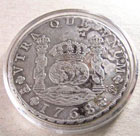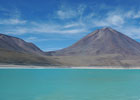In their obsessive search for gold and silver, the Spanish arrived here in the 16th century; they quickly defeated the Incas, and changed the economic and social fabric of Bolivia forever.
 During its 300 years of colonial rule,Spain continually searched forprecious metals, and in the process forced Indian labor to do the work. The silver mines they discovered at Potosi proved to be the largest ever in the western hemisphere.
During its 300 years of colonial rule,Spain continually searched forprecious metals, and in the process forced Indian labor to do the work. The silver mines they discovered at Potosi proved to be the largest ever in the western hemisphere. In 1809, the "Liberator", Simon Bolivar, (Bolivia's namesake) began the battle for independence. After the Spanish defeat in 1824, Bolivia finally gained its hard-fought freedom in 1825.
Typical of a new, upstart country, political instability, coups, countercoups and rewritten constitutions were commonplace, as numerous leaders tried to reform the country.
In the late 1800s, civilian governments came into power, and for almost fifty years Bolivia enjoyed relative political stability; its economy improved for all but the indigenous Indians.
Then, after losing a regional war with Paraguay in 1935, in which it lost much of its original territories, military control returned and a long series of military governments controlled the country till 1982, when the country again returned to a democratically elected form of government.
 Today, though reform is in the air, it remains one of the poorest and leastdeveloped countries in South America, and dependent on foreign aid.
Today, though reform is in the air, it remains one of the poorest and leastdeveloped countries in South America, and dependent on foreign aid. On the real positive side, this marvelous land of naturalbeauty has vast quantities of untapped gas, gold, oil and silver deposits, as well as a large palette of colorful attractions for all travelers.
No comments:
Post a Comment